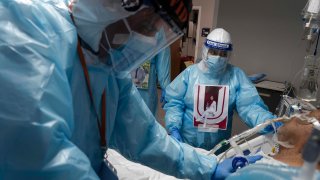
- Texas and Connecticut public health officials announced on Thursday that they have identified their first cases of a new, more contagious variant of the coronavirus, known as B.1.1.7.
- The Texas patient, a man between the ages of 30 and 40, was discovered in Harris County, home to Houston, the county's public health department said in a statement.
- It's likely that the variant is already circulating in Texas, because the man had no prior travel history, Dr. John Hellerstedt, the state's health commissioner, said in a statement.
Texas public health officials announced on Thursday that they have identified the state's first case of a new, more contagious variant of the coronavirus that was initially discovered in the United Kingdom.
The patient, a man between the ages of 30 and 40 with no recent travel history, was discovered in Harris County, home to Houston, the county's public health department said in a statement. The man was isolating and in stable condition, and local infectious disease experts are tracing all of his contacts to find and monitor other people he may have exposed to the virus.
It's likely that the variant is already circulating in Texas, because the man had no prior travel history, Dr. John Hellerstedt, the commissioner of the Texas Department of State Health Services, said in a statement. He added that genetic variations in viruses "are the norm," and it's not surprising that the variant was discovered in Texas considering how rapidly it spreads.
"This should make us all redouble our commitment to the infection prevention practices that we know work: masks any time you're around people you don't live with, social distancing, and personal and environmental hygiene," Hellerstedt said.
Shortly after Texas officials announced their first case, Connecticut Gov. Ned Lamont said in a tweet that his state identified two Covid-19 cases with the new variant, known as B.1.1.7, in people between the ages of 15 and 25. Both of those patients had travel histories outside the state — one to Ireland and the other to New York state, Lamont said.
"As we said last week, given the speed of this new strand of the virus and its identification in several states throughout the country, we presumed it was already in our state and this info this morning confirms that fact," the governor said in a tweet.
The strain, which has also been found in California, Georgia, New York, Florida and Colorado, is thought to be more transmissible but doesn't appear to make people more ill or increase the risk of death from Covid-19, experts have said. Earlier on Thursday, Pennsylvania health authorities said they identified their state's first case with the new variant.
Harris County Judge Lina Hidalgo, the county's top elected official, said in a tweet on Thursday that the discovery of the variant in the area is "disturbing" given the already rapid spread there.
As of Thursday, the county remained in its most severe threat level, "level one," which means testing and contact tracing efforts are strained and outbreaks are "present or worsening," according to the county's website.
When the county is in this level, residents are advised to only leave their homes for essential purposes and minimize their contacts with other people when possible.
Money Report
Officials from the U.S. Centers for Disease Control and Prevention have said that the current vaccines should work against the new variant, though more hospitalizations could occur if it is allowed to spread unchecked. Federal health officials are also on the lookout for a second separate new strain, first identified in South Africa.
The CDC does not yet know how widespread the new B.1.1.7 variant is in the United States. The agency now requires all airline passengers traveling to the United States from the United Kingdom to present, before boarding, proof of a negative Covid-19 test taken no more than three days before their departure.
— CNBC's Will Feuer contributed to this report.






